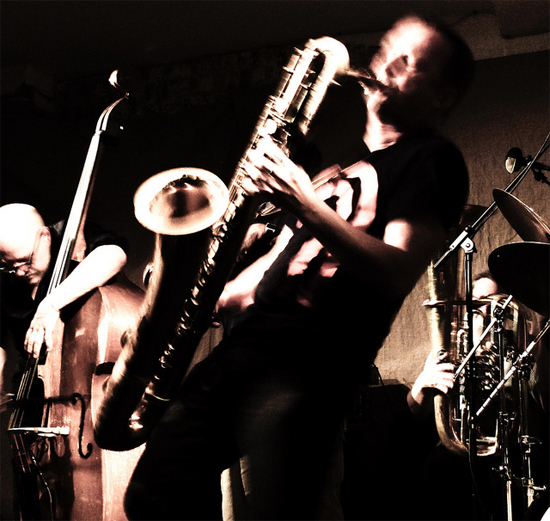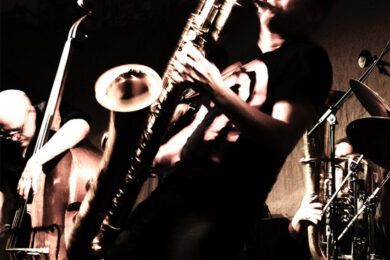If I need to be reminded that music is something that people make, not just talk about, I listen to free jazz.
Other music can do it too, of course – anything that brings the physicality of sound back to me, reunites head and body: a soft voice, a vibrating bass speaker, an fiendish guitar line, a particular sequence of beats and silence. But if I need to be reminded that music is about not just information but action, and that its magic is bound up in the way it unfolds in time, live improvised music is generally a good call.
If I need to remember that music isn’t something you stop doing when hipster culture dictates that you should, I listen to jazz then, too. If I want to trace extreme music back to its most vital origins, I listen to veteran sax player and noisemaker Peter Brötzmann and his contemporaries, for whom musical form, ideology and expression are intertwined at the roots.
If I want to indulge in the myth of the ‘band’, I don’t think of four-piece formations, or conflicting duos, or power trios. I chase out arkestras, choirs, Africa 70s, all-stars, families, crews and cults. Feminist noise collectives and Futurist space funk troops; liberation orchestras and marching bands. In this increasingly atomized, individualistic musical landscape, I get hungry for numbers, nostalgic for and fascinated by the sound of community.
And if I want to see this particular intergenerational big band, all ten – actually eleven – of them at once, I need to stand on something: Café Oto is full to capacity, and there’s no stage. I balance myself on a bench at the back of the room, getting a clear line of sight across the audience to the brightly lit, anthill-busy space at the front.
Bröztmann’s Chicago Tentet, which includes musicians from Germany and Scandinavia as well as the US city, perform together after trio and solo sets from some members of the group, so there’s ample time to check out the kit that awaits the rest of them and imagine the sounds it’ll all make. Cellist Fred Lonberg-Holm has a small selection of pedals arranged on the floor; the sight of Per Åke Holmlander’s tuba, sat at the back like a big dog waiting for its master, makes us smile. The drums that’ll be manned by Paal Nilsson-Love and Michael Zerang face one another at opposite sides of the stage space like architectural supports; a double bass, which Kent Kessler will pick up for a hypnotic solo set, lies on its side.
First, though, Sonore – a trio of Peter Brötzmann, Mats Gustafsson and Ken Vandermark – step into the thicket of mics and instruments and begin to play. The three switch between various reeds: clarinets, saxes, Brotzmann on what I think is a tarogato, a Hungarian instrument that looks and sounds like a clarinet but with an earthier, harsher and slightly middle-Eastern sound. But it doesn’t matter so much what the instruments are: the mulchy, rich tones of all three players quack and chirrup and sidle between one another with remarkable fluidity, exchanging textures and harmonies. At times, it’s like listening into a conversation, with Vandermark and Gustafsson as punctuation to Brotzmann’s more serpentine, narrative lines.
There are no drums, no bass, no obvious rhythm, yet there’s something in the interlocking patterns that could make you move, if not quite dance. It is searingly abstract but in being so it’s also elemental, an organic force that can be felt in the throat and the knees. When it doesn’t work, improvisation is a cerebral mess, for geeks and masochists only. While I might be both those things sometimes, tonight I don’t feel like either, as the trio close with a beautiful three-sax piece that builds like a kind of chorale, Vandermark’s understated, elegant playing coming to the fore.
You didn’t have to have heard Brotzmann in conversation with Chicagoan stalwart Vandermark before the show tonight to sense that he’s still somewhat burdened with the reputation of his landmark 1968 recording Machine Gun and the language that surrounds it: that of rapid-fire sax attack, revolutionary noise; high-volume and distortion as radical gestures; the usual encumbrances of extreme music. It’s also quite easy to hear from his playing the distance he’s travelled from that statement of intent. It would be pretty weird had he not done so. Yet Brötzmann can never not be an extreme player: there’s a delicious oddity in his playing, always, an alien, spare, ascetic quality, the sense of someone chipping away at the limits of their own musical language, exploring and re-exploring. As he takes to the floor again, standing not in the centre but to the very right of the eleven-piece group, his distinctive tone is like a mutation, a rogue cell in the organism, around which others cluster.
The word ‘cell’ has a revolutionary usage too, and in the pre-concert interview, Brötzmann talks of the large band as a community, a society in microcosm; one trio offshoot (legendary trumpeter Joe McPhee with Fred Lonberg-Holm and Michael Zerang) calls itself Survival Unit. While there’s a practical aspect to this – sustaining a large-scale live band requires not only musical chops but organizational, interpersonal, financial nous – Brötzmann plays with the idea of band-as-society musically too, with compositions that allow for individual freedom and co-operation within a framework, relationships that are supported and explored as they develop.
So how does this sound? I hope not as worthy as I think I’ve just made it seem. Seeing and hearing these groupings come together, mutate, fall apart is riveting, joyous, a celebration of possibility, over and over again. The group play in sub-groups of two, three, four, shifting focus and attention subtly and gracefully. Moments stand out: Joe McPhee, unimpeachably cool, in a duo with Ken Vandermark which is gradually joined by the rest of the horns until it’s a sublime cluster; Lonberg-Holm’s cello, which initially seems a bit lost, gradually finding its place in the mid-range; Jeb Bishop and Johannes-Andreas Bauer’s two trombones in a tense stand-off; the contrasts between Zerang and Nilssen-Love’s drumming, the latter hard-hitting and challenging and the former more multilayered, shifting, mesh-like.
The big band formation both simplifies and complicates the music: there’s so much going on, yet the force of numbers encourages the players to pare down to essentials, flare only briefly into solos, and sporadically – and awesomely – hit some stern, loose grooves that no one can quite pull off the rails, although everyone has a go. These moments of mutated funk are high points among high points, with a power that seems to hover in the air above us. We’re now building up to a final piece in which Gustafsson, who’s been relatively held back until this point, lets loose one of his shredding solos, owning the space around him physically and sonically. Soon a flock of noise gathers around him, though, like a marching band in the distance, coming closer. Something big’s about to happen. There’s a sudden burst of horns in unison – one, two, three, four, I wasn’t counting how many blasts, are you kidding, I was dancing – and silence.
There are eleven men in front of me who have all playing fit to burst, all at the top of their game, but if this was just a macho skronk-off, I wouldn’t be smiling this hard. Whether or not I needed reminding of how improvisation is not about being the loudest and most complex, but about the depth and grace of listening, I just have been. And while I am still not sure if a big band can be a society or a community, at its best it can make you remember that you are part of one.



